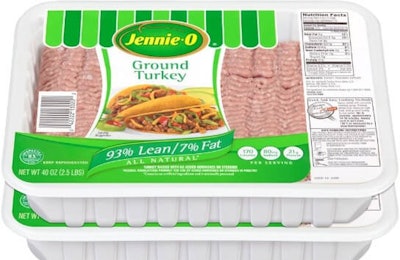
Because of the bird losses from the 2022 highly pathogenic avian influenza (HPAI) outbreak decreased sales and “large supply gaps” are expected for Jennie-O Turkey Store during the final half of the fiscal year.
HPAI was the dominating topic as Hormel Foods, the parent company of Jennie-O Turkey Store, announced its financial results for the second quarter of fiscal year 2021 through both a press release and a conference call with analysts.
The outbreak came at a time when the company was having a very successful second quarter, in which net sales increased 16% and the segment profit increased 387%, but Hormel Foods executives expect a very different outcome for the third and fourth quarters.
“After an excellent first quarter and significant profit growth in the second quarter, our Jennie-O Turkey Store team is facing an uncertain period ahead,” said Jim Snee, president, CEO and chairman of Hormel Foods. “We are actively managing the impacts from highly pathogenic avian influenza on (the) turkey supply and will take the appropriate actions to protect the health of the turkeys across our supply chain. Similar to what we experienced in 2015, HPAI is expected to have a meaningful impact on industry poultry supplies over the coming months. Beginning in the third quarter, we anticipate large supply gaps in the Jennie-O Turkey Store vertically integrated supply chain, caused by flock losses to date.”
And that short supply is expected to translate into an estimated 30% decline in Jennie-O sales volumes during the back half of the year, said Jacinth Smiley, Hormel’s chief financial officer.
Bird losses not as severe as they were in 2015
HPAI was first confirmed in Jennie-O Turkey Store’s live operations in March, and those losses continued. However, Snee said those losses were not as harsh as they were during the HPAI outbreak of 2015.
Snee said the Jennie-O team “quickly and effectively mobilized into crisis mode.” He praised the team for working long hours over the course of many weeks to protect the turkeys, provide transparent communications with customers and planning for future disruptions, all while conducting regular day-to-day business operations.
Snee also spoke favorably of the company’s biosecurity program, which he believes helped reduce the number of premises affected by HPAI.
“It appears the biosecurity measures the company has implemented since 2015 have provided additional protection against the virus, as the number of company-managed turkeys impacted to date is 25% lower than during the (2015 outbreak),” Snee said.
Flocks will be repopulated
The demand for Jennie-O Turkey Store products has been high, leaving no question in mind as to whether to rebuild its live bird supply.
“We are going to begin to repopulate those farms and we’re going to return the supply in a very safe and timely manner. We know that the demand is there for the product, and as supply comes back in line, we expect strong demand across retail and foodservice,” Snee said.
Plant closure successfully completed
In late 2021, it was announced that one of two Jennie-O plants in Willmar, Minnesota, would be closed. The workers from the plant on Benson Avenue would be transferred to the newer facility on Willmar Avenue, while the production done at the Benson Avenue facility would be consolidated into multiple other company facilities.
In the just-issued press release, Jennie-O announced that the Benson Avenue plant was closed during the second quarter, and about 200 employees were “successfully transferred to the Willmar Avenue facility.
Read our ongoing coverage of the global avian influenza outbreak.
















